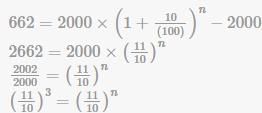Railways Exam > Railways Questions > In how many years will Rs 2,000 yield Rs 662...
Start Learning for Free
In how many years will Rs 2,000 yield Rs 662 as compound interest at 10% per annum compounded annually?
- a)3
- b)2
- c)4
- d)5
Correct answer is option 'A'. Can you explain this answer?
| FREE This question is part of | Download PDF Attempt this Test |
Verified Answer
In how many years will Rs 2,000 yield Rs 662 as compound interest at ...
Compound interest in 1 year compounded quarterly = Then, rate =(R)% per year time =(n) quarters, = P x (1 + (R/100))n - P
View all questions of this test

n = 3 years
Most Upvoted Answer
In how many years will Rs 2,000 yield Rs 662 as compound interest at ...
Solution:
Given, Principal amount (P) = Rs 2,000, Total amount (A) = Rs 662, Rate of interest (R) = 10% per annum compounded annually.
Let the time period (in years) be 't'.
Using the formula for compound interest, we have:
A = P(1 + R/100)^t
Substituting the given values, we get:
662 = 2,000(1 + 10/100)^t
662/2,000 = (11/10)^t
Taking log on both sides, we get:
log(662/2,000) = t*log(11/10)
t = log(662/2,000)/log(11/10)
t ≈ 2.998
Therefore, the time period required for Rs 2,000 to yield Rs 662 as compound interest at 10% per annum compounded annually is approximately 3 years.
Hence, the correct answer is option 'A'.
Given, Principal amount (P) = Rs 2,000, Total amount (A) = Rs 662, Rate of interest (R) = 10% per annum compounded annually.
Let the time period (in years) be 't'.
Using the formula for compound interest, we have:
A = P(1 + R/100)^t
Substituting the given values, we get:
662 = 2,000(1 + 10/100)^t
662/2,000 = (11/10)^t
Taking log on both sides, we get:
log(662/2,000) = t*log(11/10)
t = log(662/2,000)/log(11/10)
t ≈ 2.998
Therefore, the time period required for Rs 2,000 to yield Rs 662 as compound interest at 10% per annum compounded annually is approximately 3 years.
Hence, the correct answer is option 'A'.
Attention Railways Students!
To make sure you are not studying endlessly, EduRev has designed Railways study material, with Structured Courses, Videos, & Test Series. Plus get personalized analysis, doubt solving and improvement plans to achieve a great score in Railways.

|
Explore Courses for Railways exam
|

|
Similar Railways Doubts
In how many years will Rs 2,000 yield Rs 662 as compound interest at 10% per annum compounded annually?a)3b)2c)4d)5Correct answer is option 'A'. Can you explain this answer?
Question Description
In how many years will Rs 2,000 yield Rs 662 as compound interest at 10% per annum compounded annually?a)3b)2c)4d)5Correct answer is option 'A'. Can you explain this answer? for Railways 2024 is part of Railways preparation. The Question and answers have been prepared according to the Railways exam syllabus. Information about In how many years will Rs 2,000 yield Rs 662 as compound interest at 10% per annum compounded annually?a)3b)2c)4d)5Correct answer is option 'A'. Can you explain this answer? covers all topics & solutions for Railways 2024 Exam. Find important definitions, questions, meanings, examples, exercises and tests below for In how many years will Rs 2,000 yield Rs 662 as compound interest at 10% per annum compounded annually?a)3b)2c)4d)5Correct answer is option 'A'. Can you explain this answer?.
In how many years will Rs 2,000 yield Rs 662 as compound interest at 10% per annum compounded annually?a)3b)2c)4d)5Correct answer is option 'A'. Can you explain this answer? for Railways 2024 is part of Railways preparation. The Question and answers have been prepared according to the Railways exam syllabus. Information about In how many years will Rs 2,000 yield Rs 662 as compound interest at 10% per annum compounded annually?a)3b)2c)4d)5Correct answer is option 'A'. Can you explain this answer? covers all topics & solutions for Railways 2024 Exam. Find important definitions, questions, meanings, examples, exercises and tests below for In how many years will Rs 2,000 yield Rs 662 as compound interest at 10% per annum compounded annually?a)3b)2c)4d)5Correct answer is option 'A'. Can you explain this answer?.
Solutions for In how many years will Rs 2,000 yield Rs 662 as compound interest at 10% per annum compounded annually?a)3b)2c)4d)5Correct answer is option 'A'. Can you explain this answer? in English & in Hindi are available as part of our courses for Railways.
Download more important topics, notes, lectures and mock test series for Railways Exam by signing up for free.
Here you can find the meaning of In how many years will Rs 2,000 yield Rs 662 as compound interest at 10% per annum compounded annually?a)3b)2c)4d)5Correct answer is option 'A'. Can you explain this answer? defined & explained in the simplest way possible. Besides giving the explanation of
In how many years will Rs 2,000 yield Rs 662 as compound interest at 10% per annum compounded annually?a)3b)2c)4d)5Correct answer is option 'A'. Can you explain this answer?, a detailed solution for In how many years will Rs 2,000 yield Rs 662 as compound interest at 10% per annum compounded annually?a)3b)2c)4d)5Correct answer is option 'A'. Can you explain this answer? has been provided alongside types of In how many years will Rs 2,000 yield Rs 662 as compound interest at 10% per annum compounded annually?a)3b)2c)4d)5Correct answer is option 'A'. Can you explain this answer? theory, EduRev gives you an
ample number of questions to practice In how many years will Rs 2,000 yield Rs 662 as compound interest at 10% per annum compounded annually?a)3b)2c)4d)5Correct answer is option 'A'. Can you explain this answer? tests, examples and also practice Railways tests.

|
Explore Courses for Railways exam
|

|
Suggested Free Tests
Signup for Free!
Signup to see your scores go up within 7 days! Learn & Practice with 1000+ FREE Notes, Videos & Tests.
























